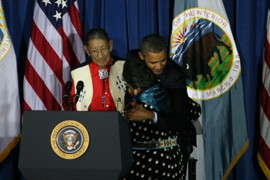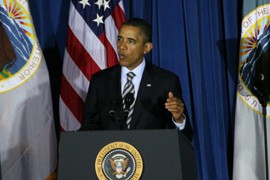Cronkite News has moved to a new home at cronkitenews.azpbs.org. Use this site to search archives from 2011 to May 2015. You can search the new site for current stories.
Obama says tribes at positive ‘turning point,’ does not mention funding
WASHINGTON – President Barack Obama told tribal leaders Friday he is “a president who’s got your back,” in a speech that promoted sovereignty and pledged improved federal cooperation.
But the president’s speech made little mention of how to fund Native American programs, a specific concern for some tribal leaders.
Obama’s speech at the Tribal Nations Conference in the Interior Department’s headquarters was the final note in a week that saw several federal agencies propose policies that aim to give tribes more leeway in economic matters and open up lines of communication.
“When you go back home, making your communities better places to live, I want you all to know that you’ve got a partner in Washington,” Obama said. “You have an administration that understands the challenges that you face and, most importantly, you’ve got a president who’s got your back.”
Diane Enos, president of the Salt River Pima-Maricopa Indian Community, hailed Obama’s administration in an interview after the speech, but she also said she is worried about budget cuts.
Many tribes, especially small ones, rely on federal discretionary funds to provide basic social services. That money is not completely secure as the federal government tries to trim its budget and reduce the national deficit.
In a morning speech at the conference, Office of Management and Budget Deputy Director Heather Higginbottom said the administration is looking to “maximize resources and minimize costs” as it funds tribal programs in 2012.
“Next year’s budget will be tight, but it will be smart,” Higginbottom said.
Enos said similar language was used in small meetings Friday, and she did not like the sound of it.
“There was a discussion about flexibility in funding,” she said, shaking her head. “We need something stronger than that.”
But Jefferson Keel, the president of the National Congress of American Indians, said he trusts the administration to find a way to fully fund Native American programs – and he said the administration is looking for ways to improve cash flow.
“We’ve made some gigantic gains with this administration,” he said before Obama’s speech. “The gap has been so large for so long, any effort helps.”
The annual conference began in 2009. This year, federal agencies unveiled several policy changes leading up to Friday’s main event.
The Interior Department proposed looser restrictions Monday on leasing Indian trust land, and two days later it mandated more consultation with tribal governments before certain decisions are made.
On Friday morning, Obama signed a plan to improve American Indian education systems. The White House Initiative on American Indian and Alaska Native Education would operate under the Interior and Education departments.
“We’re going to find ways to reduce the dropout rate. We’re going to help students who’ve already dropped out re-enter the education system. And we’re going to strengthen our tribal colleges and universities,” Obama said.
Hopi Chairman LeRoy Shingoitewa was on a panel this week that discussed the initiative, before the executive order was issued. As an educator for 27 years, he said he is impressed by that action and other efforts toward tribal education.
“I feel confident with the fact that we’ve seen a lot of progress,” he said.
But Eldred Enas saw little new about the president’s speech or the administration’s efforts compared to a year ago.
“I came to the conference last year, and it was pretty much the same this year, pretty much just repetition,” said Enas, chairman of the Colorado River Indian Tribes. “I’d say it is a lack of follow-up and thorough communication.”
Enas said he would like to see federal officials visit tribal communities more often, including smaller ones such as his 3,500-member reservation.
“We’re available, and they just need to get out there,” he said.








